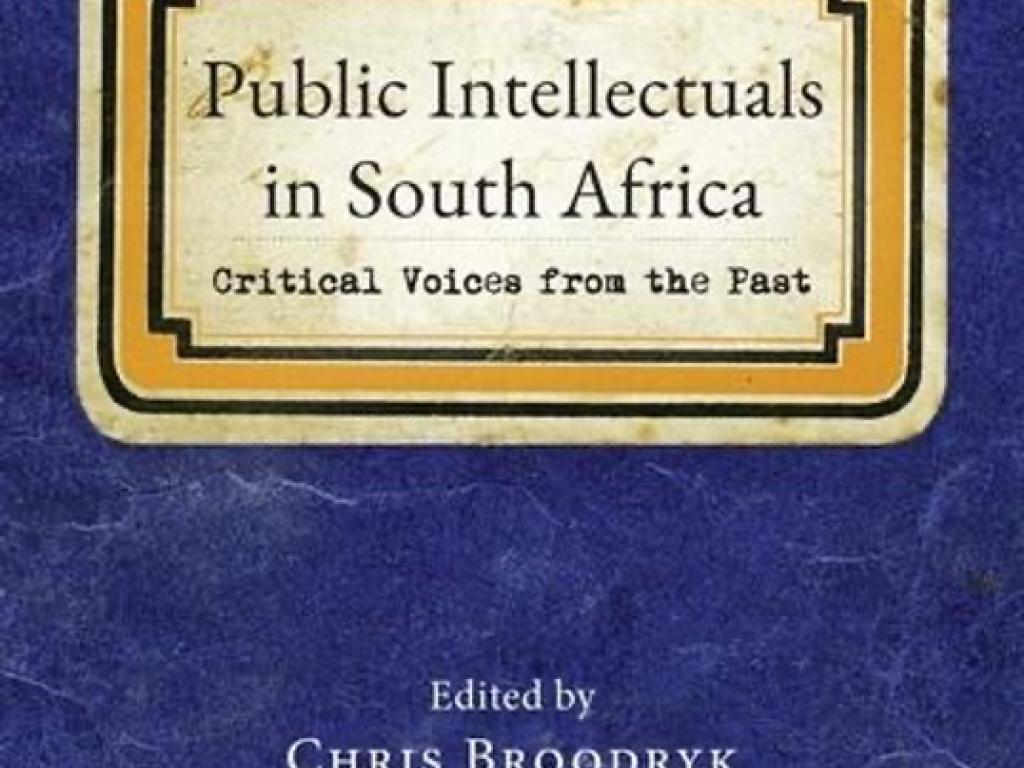Two new chapters on public intellectual engagements

APC Chair Carolyn Hamilton and APC Associate researcher Lesley Cowling contributed to a recently published book, Public Intellectuals in South Africa: Critical Voices from the Past, edited by Chris Broodryk and published by Wits University Press. [https://witspress.co.za/catalogue/public-intellectuals-in-south-africa/; see the 2020 APC colloquium discussing the draft book manuscript alongside a related APC book, Babel Unbound. http://www.apc.uct.ac.za/special-event-public-life]
Hamilton’s chapter – “Recalibrating the Deep History of Intellectual Thought in the KwaZulu-Natal Region” – challenges the tacit understanding that the defining feature of public intellectual activity in South Africa is sustained reading and writing. It offers a robust interrogation of the pervasive assumed distinction between literate, modern, hybrid and synthesising intellectuals and illiterate, authentic tribal informants relaying handed-down tradition.
Prominent Zulu-speaking intellectuals writing in the late 19th and early 20th centuries made use of existing, and presumably long-standing, concepts – about, among other things, the nature of rule, government and nation, as well as gender roles. They used these to discuss how things were in the past, present changes and imagined futures. There was a range of other places where such discussions were going on, also in isiZulu, about the same and related topics, but which were happening orally. This point registers the existence of a wide and rich discursive environment in which prominent Zulu speakers were deliberating about the key questions of the day and, like the writers, were exploring a variety of ways of brokering the past into the present, but doing so orally.
The chapter argues that what these speakers offered was not relayed, formulaic oral tradition, as it is often characterised, but thoughtful disquisitions on the past, mobilised to reflect critically on contemporary changes and to assist in envisaging the future.
Neither the written and oral political discourses, and the intellectual activities that they involved, were new features of life in the region in the late 19th century. There are clear indications of similar debates and forms of brokering of the past into the present in the eras before colonialism, especially in circumstances of dramatic political changes.
History produced by Black writers was consigned out of the field of historiography as literature and politics, while the oral productions of history by Black thinkers, typically in rural settings, were, in turn, positioned as sources. This double manoeuvre not only denied historical authority to both of these forms of history production, but favoured the narratives of the rural “informant” as historically more authentic than the writings of the urban intellectual, thereby lancing both forms of historical production of their discursive potency.
The chapter offers thus an historical perspective on the weight of what Bheki Petersen has termed the Black Humanities developed over the last century by intellectuals and thinkers, writing and speaking outside academic disciplines.
Cowling’s chapter – “In Conversation with the Nation: Sowetan’s Maverick Editor Aggrey Klaaste” – looks at the ways in which Klaaste sought to intervene in South Africa’s fraught political situation in the late 1980s and early 1990s. Klaaste’s “big idea”, as he called it, was nation-building, a philosophy that represented a significant shift from the activist culture then current in Sowetan’s newsroom. It was also opposed by many Black Consciousness-aligned and anti-apartheid organisations active in black townships across the country.
The chapter examines the ways in which the move to nation-building was negotiated by Klaaste in his writing for Sowetan, particularly in his weekly column, “On the Line”. The essay argues that, for the purposes of nation-building, Klaaste eschewed the conventional approach of political commentators, who tend to work in the arena of reasoned argument, using logic and evidence to make their case. Instead, he mixed storytelling, characterisation, dialogue and scene-setting to promote nation-building among his readers and peers.
The column also modelled the ways different political players could be in dialogue and sought to persuade his readers to consider an inclusive politics. The chapter argues that Klaaste played a role as a public intellectual by self-consciously presenting himself as uncertain, open to ideas, a searcher looking for the best way forward for society, but never completely sure what that should be.
Despite his location in a commercial white-owned newspaper, Klaaste had a lot in common with the editors of the black-owned publications of a previous era, which had attempted to promote the political aspirations of indigenous African communities and discuss their role in South Africa. By writing in Sowetan, the foremost black-readership newspaper in the country and highest circulating daily of the 1990s, Klaaste enabled a process of ongoing deliberation about the way forward for South Africa among a range of black South Africans, not just the educated and urban middle class. His role as “public intellectual” was thus amplified by his location in the popular space of the tabloid newspaper.